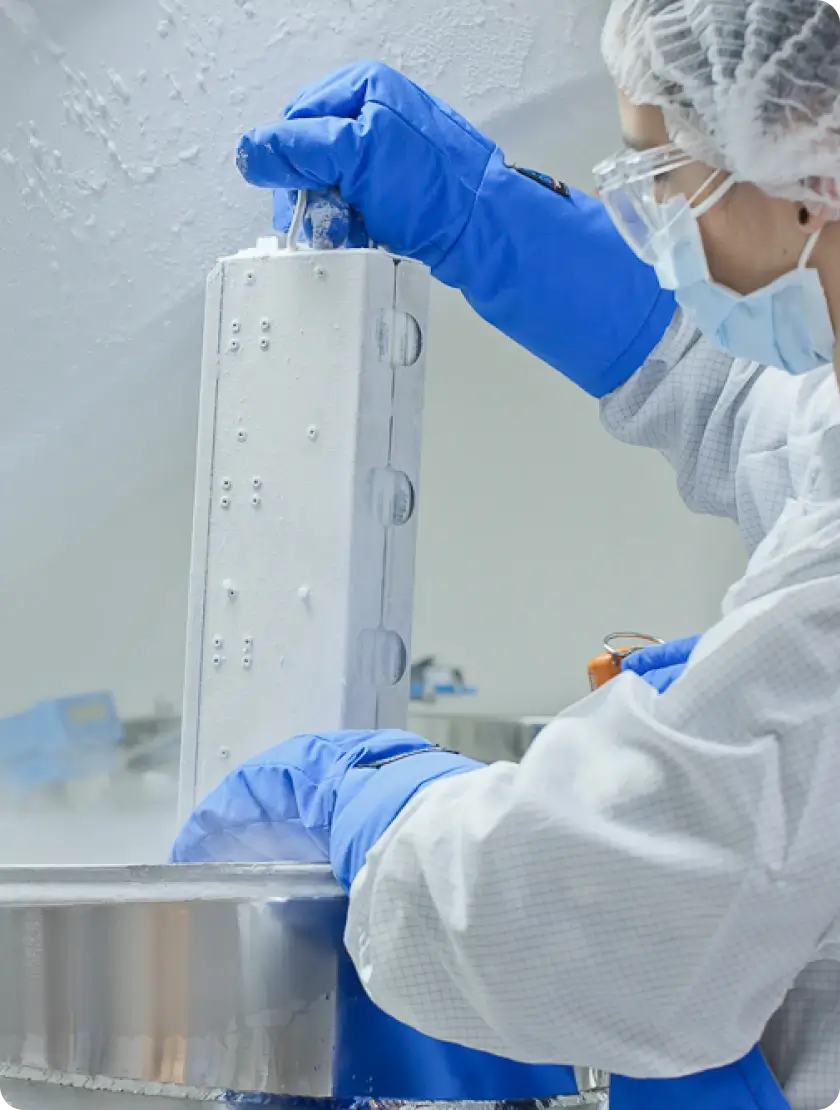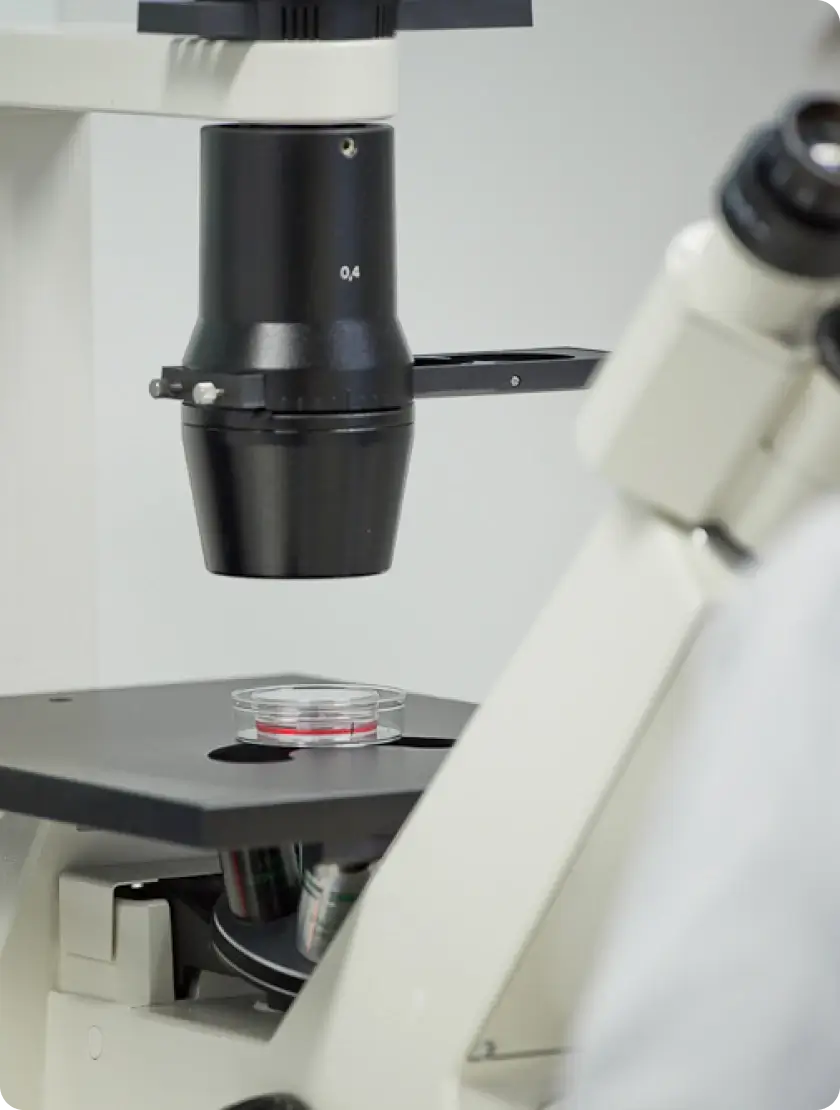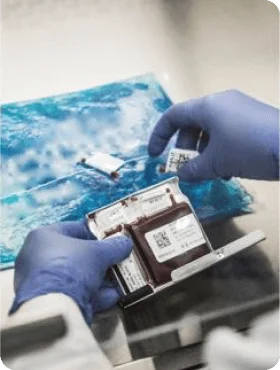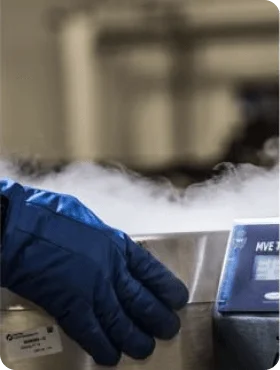Stem cells
from the umbilical cord
What are stem cells?
Stem cells are primitive, non-specialised cells characterized by their limitless potential to proliferate and their unique ability to differentiate into specialised cells whereby tissues are formed. Their properties have been used to renew or replace damaged cells. Stem cells can be retrieved, among others, from the umbilical cord blood.
Bone marrow was the primary source of stem cells (bone marrow transplantation involves transplanting stem cells derived from the bone marrow), whereas nowadays, the umbilical cord blood stem cells are more frequently applied for therapeutic uses. Other sources include the peripheral blood drawn from donors who underwent pharmacological mobilisation.
Each living organism, through the course of its life, systematically produces new cells which subsequently mature and differentiate into more specialised cells. Eventually, these cells perish after a specific period of time, as inscribed in their genetic code. Specific stem cells are cells which directly replace dead cells with new ones. All stem cells, even if transiently present in the body, can be subdivided into the four categories: totipotent, pluripotent, multipotent and unipotent. Multipotent type of cells include haematopoietic stem cells and human umbilical cord blood is a good source of them.
Umbilical cord blood – collection and
storage
Cord blood is blood that stays in the umbilical cord and placenta after birth and after the child’s abnegation. It is a valuable source of stem cells. Until recently it was treated as “waste” and recycled together with the placenta and umbilical cord. Currently, it is taken to isolate stem cells for storage and subsequent use in therapy.
Stem cells from umbilical cord blood, like those from the bone marrow, can be transplanted to rebuild the hematopoietic and immune systems, and show greater efficacy than stem cells obtained from adult donors. They can be used both for autologous transplants (then the donor is the recipient of the collected cells) and allogeneic (the recipient gets the cells from another person, e.g. family transplants).
Collecting umbilical cord blood
Collecting umbilical cord blood is a simple activity. They are performed after the umbilical cord is cut and the blood is taken from the part of the umbilical cord that is connected to the placenta, so the process is completely neutral for the child.
Usually, a trained midwife will perform procedure of cord blood collection. Parents, who wish to save cord blood bank for their family must remember to bring a special kit with them to the hospital on the day of delivery. After collection, biological material is picked up from the hospital and transported to the laboratory by a dedicated medical courier.
Collecting umbilical cord blood s a simple and non-invasive procedure.
Storage of umbilical cord blood
Umbilical cord blood can be stored virtually indefinitely, without fear of losing valuable properties. In our laboratory stem cells from umbilical cord blood are stored until they need to be used.
In the whole world there is already over 1 milion portions of cord blood stored
Advantages of stem cells from umbilical cord blood
Due to the advantages of umbilical cord blood cells over bone marrow cells, they are increasingly used in saving lives. Although stem cells from the bone marrow can be taken throughout life, the cells collected from umbilical cord blood are much more valuable, as illustrated in the table:
Umbilical Cord Blood
Bone Marrow
blood harvesting takes several minutes at childbirth, it is non-invasive and safe
collection can take a minimum of 25-30 minutes to be performed, the collection procedure involves a puncture of the wings of the ilium under general anaesthesia
cord blood is retrieved from placenta and umbilical vessels – which minimises the risk of contamination
the donor is usually an adult who could be a symptomless carrier of viruses which could become active after the transplantation, risk of contamination exists
cord blood is available after deposition in a transplant bank and awaits the recipient
the marrow has to be harvested from a donor who, even if registered, is required to be present in order to confirm compatibility and collect the marrow, the donor must be in excellent health to allow the bone marrow harvest
greater proliferation capacity (cell multiplication, cellular rebirth) as opposed to bone marrow
cells reduced capacity to proliferate in comparison to cord blood cells
EASY – 6 Human Transplantation Antigens (HLA) are tested out of which only 4 are required to be compatible between the blood and its recipient
EXTREMELY DIFFICULT – 10 Human Transplantation Antigens (HLA) undergo testing out of which 8 must be compatible between the bone marrow donor and the recipient
cord blood can be retrieved only once throughout life – at birth
theoretically any adult meets the criteria for becoming a bone marrow donor, registration is simple and inexpensive, however finding a matched donor available on specific dates may prove complicated
the average cord blood unit is suitable for recipient weighing approximately 40 kg, blood units can be combined, with bone marrow or peripheral blood
bone marrow harvested from an adult will in general provide a sufficient supply of stem cells for a donor with 70-80 kg body weight
cardiovascular system regeneration process following transplantation takes up to a month
cardiovascular system regeneration process following transplantation takes up 2 weeks
Umbilical cord tissue
The umbilical cord contains special cells called mesenchymal cells (MSC). They have slightly different properties than umbilical cord blood cells – they are much more easily differentiated into other types of cells, e.g. nervous, bone, cartilage.
MSC’s could be found in so called Wharton jelly. It is a specific tissue that surrounds umbilical vessels. The umbilical cord can be easily collected after delivery. The doctor or midwife cuts the piece (10-15 cm long) of the umbilical cord and puts it in a special container. In the laboratory, umbilical cord tissue is tested, divided into the small pieces and and then frozen. It is also possible to isolate MSC’s before freezing.
FAQ
-
Is the collection of umbilical cord blood safe?
-
How long can cord blood be stored?
-
Are there medical reasons that could prevent the collection of cord blood?







